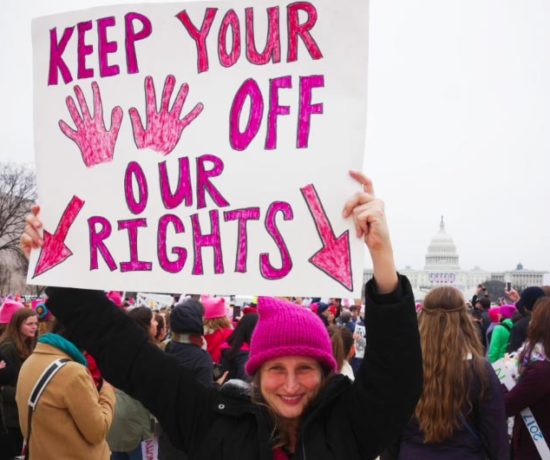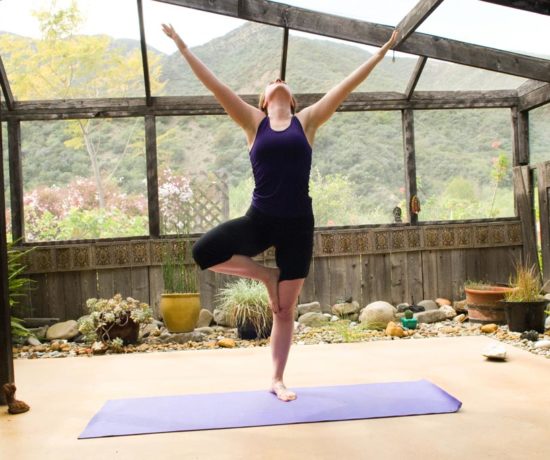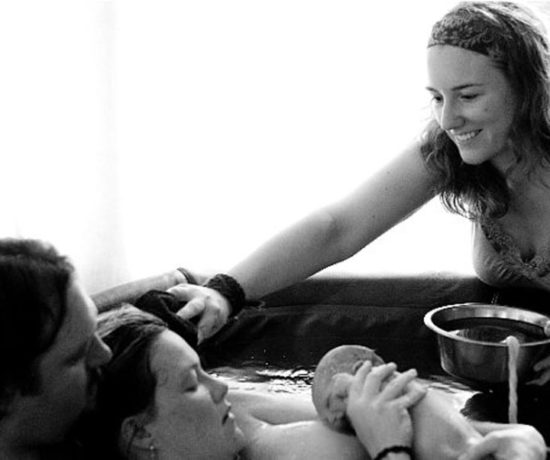I got into birth for the pure, vibrant life force of it. I wanted to see new babes come out screaming, flailing their limbs as they learned to translate their dark and warm existence in the womb into this crazy planet we are all sharing together. I got into birth to hear little squeaky cries and witness tears of parental joy. I got into birth to take care of healthy women, and help them experience the normal physiological and sexual process of getting a baby out and into the world.
I did not get into birth to witness death — I thought I would leave that to nurses who chose the fields of oncology, gerontology, and trauma, amongst other specialties that are used to helping people die.
My sweet, wonderful grandmother died a month ago, and since she left us I have been thinking a lot about how much time we’re granted. It’s tapped into some pretty deep, extensional stuff, actually. I literally fled a birth at the hospital to be with her when she took her last breath, and I would put that experience amongst the most incredible births that I’ve ever witnessed. Watching people pass in and out of the universe is about as close to the edge as one can get.
I had seen many births before becoming a nurse, all of them with the outcome of a healthy mom and a healthy baby. Some of those women did not want the epidural they ended up getting, or did not want the c-section that brought their baby into the world, or perhaps did not want to birth in a hospital when they had other visions for their birthplace. But all of those mamas ended up with babes in arms.
In my first year as a labor nurse, I have attended the births of four babies who were never going to take that first, vigorous cry. In those little bodies were the makings for a thriving human being: all the organs that need to elegantly pump and expand and contract to make life work. But for unknown, completely happenstance reasons, none of them were earmarked for breathing and moving once on the outside.
In medicine, we call this an “IUFD,” Intrauterine Fetal Demise. The cause of death is often unknown, and the mother has to go through the birth process knowing that her baby is dead. At the nursing station, we have a chalkboard of sorts that keeps the staff updated on the process of each labor: Room 1 is about to deliver, Room 2 is about to start Pitocin, Room 3 baby boy was born at 4:42pm, etc. When you see the dreaded “IUFD” on the chalkboard, your heart sinks in reverence for that family. There will be no sweet baby cries coming out of that room.
My first IUFD was of a baby that was technically viable, in the late 20’s weeks of gestation. The mother hadn’t felt the baby move, and we told her to come in to triage for assessment. Women who don’t feel their babies move worry, and they call us all the time, and we always tell them to come in for evaluation, and it’s usually fine. And sometimes, it’s not fine. You look for a heartbeat with the cardio monitor, you look with a doppler, you hope the equipment is broken. In this case, the heartbeat just wasn’t there.
During her labor, I heard noises that I’ve never heard before. The noises of labor pain are so familiar to me: grunting, yelling, swearing, screaming. But it’s always followed with laughter and joy and kisses on a warm, slippery new baby. The noise of a woman experiencing physiologic birth with the known outcome of a dead baby is a sickening song. It’s pain of the uterus and the cervix and the vagina met with the deep, unthinkable pain of grief taking over the heart, the lungs, the mind, the soul.
As that baby slipped out, I looked into the eyes of one of my favorite staff doctors who attended the birth. We both felt so much sadness, we had to look away from each other.
The second time I witnessed this bizarre and other worldly type of birth was of twins who were a few days away from viability. The mom’s water had broken, and despite every medication and trick we could administer, her cervix continued to dilate. Her babies were going to come too early, and there was no stopping them. As the first twin was born, I handed the baby to her father, who held her as his wife gave birth to the second. The baby’s chest rose and fell as she tried to breathe on her own, but she never made a sound.
I split my attention between helping the mother with the second delivery and listening to the declining heartbeat of the first twin. It’s a weird thing, to hear a heartbeat just fall out of a person one beat at a time. The mother was very stoic until the second twin was delivered, at which time I heard that same terrible song of grief that is so unique to this type of experience. As soon as the second twin, a boy, came out, the mother’s wailing overtook her. He, of course, did not make a peep.
The first twin died first. The father of the babies held the second twin, who also attempted to take some breaths and had a diminishing heartbeat, and looked up at me and said, “there’s got to be some little baby somewhere in the world who made it this small, isn’t there? Isn’t there anything you can do?” I was the only staff in the room at this time, and the power of that question left me speechless. I had to force the words out of myself. “I’m so sorry, there is nothing we can do.”
The most recent birth loss that I attended was my first shift back after my grandmother’s funeral. I came to work hoping for a light assignment to hop back into the swing of things: a first time mom who thought she was in labor but wasn’t, or perhaps some dehydrated patient who just needed IV fluids. Instead, I got a full term IUFD. That is the worst possible kind. It’s a baby, with all 10 fingers and 10 toes, who weighs 7+ lbs. It’s not teetering on viability, it doesn’t have see-through skin, it’s a full blown person.
This mother spoke only Somali, and her partner spoke some English. The room was an inflow of complete cacophony all day long. Between the midwives, doctors, interpreters, and phlebotomists who came to care for her, combined with the constant stream of family members, the noise level was almost akin to a public space. In my experience, Somali women have an incredible network of communal support in birth. There is always plenty of food, plenty of hot tea, and plenty of loud words of what I assume are support, but I can’t be sure since I don’t speak Somali.
This birth was no different: there was plenty of food, plenty of hot tea, and plenty of loud words.
As the baby came out, I felt the choking absence of a stethoscope around my neck. Usually when I see a head coming, I look down at my watch to mark the time, grab the bell of my stethoscope to make sure it is ready for listening, and peek back at the baby warmer to make sure blankets are stocked and warming. When there will be no baby’s heartbeat, you don’t need a stethoscope. I had already taken the warmer out of the room. It seemed like dangling the prize in front of someone who could not win.
As soon as the baby slipped out of her body, the five Somali women in the room who had been chattering and arguing all day knelt down and wept. They cried for Allah, they cried for that baby, they cried for their mama friend.
The midwife tried to offer the baby to its parents, but they were not ready to see him. I had to go find a crib, since I had intentionally taken it out of the room. The midwife put him in the crib and I swaddled him in our hospital blankets. The five Somali women leaned around the crib and laid hands on him. If I did not know the situation, it would have looked like just another day, just another birth with another batch of visitors.
He stayed in the room for about 15 minutes, and after the placenta was delivered the mother wanted to see him. We wheeled the crib up to the edge of the bed and she peered into it, but couldn’t hold him. She looked at her husband, who said to me in broken English, “you take him now, we are done.”
I started to take the baby away, and two of the older Somali women walked up towards me. The husband said, “two moms say thank you.” The mother and mother-in-law bowed down to me. I thought I might either burst or melt with gratitude and grief – I wasn’t sure which would happen.
A few hours later, as I un-swaddled that babe, I gave him his first and only bath. His limbs felt like the limbs of every other baby I have ever bathed, but they didn’t move. His footprints, with inked toes on paper, looked the same as every other footprint I have made. But he didn’t try to squirm away as I did them. As I stood in the back of our unit, hidden from healthy moms and healthy babies, giving this dead baby a bath at 3am, I thought, man, this is some heavy shit I’ve walked into.
There have been times that I’ve felt guilt for choosing labor & delivery as a specialty, because I’ve chosen literally the ONE element of medicine that is usually about health and joy over sickness and pain. Especially because the medical work of my parents has been so profound in our community, and their populations are so sick and layered, I have worried that I took the cheater’s way out and went to nursing school just to hang out with the healthy patients experiencing a normal life transition.
Since starting at HCMC, where the patient population is often quite challenged in both their social and physical bodies, I have started to let go of some of that guilt. I think I finally laid it to rest a few weeks ago, giving that sweet little dead Somali babe a bath in the middle of the night. It’s not an easy task, and not one I signed up to do. But I honor and respect it more each time it has happened.
I have never felt more like a nurse than in caring for these three families. The usual tasks of charting and fetal monitoring just get tossed out the window. The job becomes one of witness & support. It actually reminds me of my work as a doula — being with women and their families as they experience a major transition, without focus on the medical aspects of the process.
My grandma had 90 years on this earth, and even though I miss her, I know that she had a good run. I have no explanation for why these four little babes never got their chance. I do feel like I’m learning that it’s unfortunately a part of the process. While it’s rare, sometimes you leave the hospital without a babe in arms.
This weekend I attended the birth of an amazingly strong mother of two young boys, who pushed her third boy out without any medications or interventions. He came out yelling, and she and I spoke softly to each other in French, her native language.
The midwife who caught that baby was the same midwife who caught the sweet little Somali baby who didn’t make it. The midwife and I have not had a birth together since the IUFD, and this, the first one together after that experience, could not have been more picture perfect.
Full circle. Bring it on.




